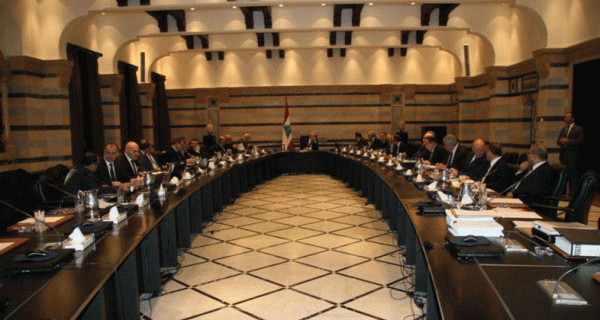February 15, 2014 – February 15, 2015 - Tammam Salam’s government marks its first year in office
Government sessions
Since its formation on February 15, 2014, the government has convened 48 sessions, 14 under President Michel Suleiman and 34 amidst presidential vacuum. By month, the Cabinet sessions broke down as follows:
February 2014: 1 session dedicated to form the ministerial statement committee
- March 2014: 4 sessions
- April 2014: 4 sessions
- May 2014: 6 sessions
- June 2014: 3 sessions
- July 2014: 3 sessions
- August 2014: 5 sessions
- September 2014: 4 sessions
- October 2014: 5 sessions
- November 2014: 3 sessions
- December 2014: 3 sessions
- January 2015: 5 sessions
- February 2015 (until February 15): 2 sessions
Decrees
During its first year in office, the government approved 2315 decrees, 860 in the era of President Michel Suleiman and 1455 after his departure. Since Article 62 of the Lebanese Constitution stipulates “should the presidential seat fall vacant for any reason whatsoever, the Cabinet shall exercise the authorities of the President of the Republic by delegation,” the decrees issued after the expiry of Suleiman’s term were all signed by the 24 ministers, in conformity with the established norms. The numbering of the decrees started from one, the same as if a new presidential term had just begun.
The exigency of having the signature of all 24 ministers has at times hampered the approval of some decrees and crippled the work of the government. This has led PM Tammam Salam and a number of MPs to urge the amendment of this obstructive mechanism and to invoke Article 65 of the Constitution, which stipulates that the Cabinet shall make its decisions by vote of the majority of attending members and only basic issues shall require the approval of two thirds of the members. While Salam and his supporters maintained that unanimity voting was a contrived novelty that did not exist in the Constitution, the opposing group argued that the claim would ring true if a President of the Republic were to be present, but amidst the current presidential vacuum, unanimity was necessary.
Appointments
The government of Tammam Salam appointed 41 people to Grade 1 posts. The sole appointment made after the departure of President Suleiman was to the post of Director General of Archeology.
Accomplishments and failures
The government of national interest made several vows in its policy statement. Some of them were fulfilled and many others were doomed to failure. Most disappointing was the failure of the government to adequately address the implications of the crisis of Syrian refugees and to act on the first round of licensing for offshore oil exploration.
“Injecting momentum into the state’s administrations by filling the numerous vacancies in civil service” proved to be just another hollow promise as the Lebanese continued to experience further administrative deterioration. The government pledged to “address the financial problems, revive the economic sectors and improve the living conditions but failed once again tolive up to its promises and followed in the footsteps of its predecessors by leaving the 2014 budget unapproved.
Maintaining the minimum required stability to avoid utter collapse is perhaps the sole achievement worthy of mentioning.
In the wake of the presidential vacuum, the government of national interest has, alas, turned into a government of necessity. The question thus remains ‘how long will this government last and how long must the Lebanese wait for a president as a potential savior?’








Leave A Comment